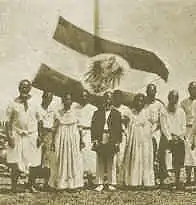Nauruan Civil War
The Nauruan Civil War was fought from 1878 to 1888, between forces loyal to incumbent King Aweida of Nauru and those seeking to depose him in favour of a rival claimant. The war was preceded by the introduction of firearms to Nauru. For the majority of the war, the loyalists and the rebels found themselves in a stalemate, with one side controlling the north and the other controlling the south. In 1888, the German Empire intervened by restoring Aweida to the throne, and by taking combatants' firearms (by the time they had finished, the Germans had confiscated 791 rifles from the Nauruans, nearly one gun for every inhabitant of the island). Over the course of the war, Nauru had lost around 500 people, a third of the pre-war population.
| Nauruan Civil War | |||||||||
|---|---|---|---|---|---|---|---|---|---|
 Photo of a Nauruan warrior in the Nauruan Civil War around 1880 | |||||||||
| |||||||||
| Belligerents | |||||||||
|
King Aweida Loyalists | Anti-Aweida rebels | ||||||||
| Commanders and leaders | |||||||||
| King Aweida of Nauru[1] | Unknown rival claimant[1] | ||||||||
| Units involved | |||||||||
|
Loyalist tribes | Rebel tribes | ||||||||
| Casualties and losses | |||||||||
| ~500 dead, Nauruan population reduced from 1400 to 900. | |||||||||
Background
Since the British captain John Fearn discovered Nauru in 1798, it had been avoided as much as possible by sailors, due to its notoriety as a station for pirates. Nevertheless, in the 19th century, the immigration of Europeans, often lawbreakers, steadily increased. Traditional life had been disrupted by the introduction of firearms and spirits, an unknown form of alcoholic drink in ancient Nauru, although the Nauruans consumed toddy (palm wine) for several thousand years.
Course of the war
Outbreak
The conflict began during a marriage festival; while discussing a point of etiquette, which turned into a heated argument, one of the guests fired a pistol and shot a young chief. The need to avenge the young chief's death was perceived as clear in a Nauruan cultural context. Former feuds had their origins in similar incidents, but this time every family in every tribe's clan had guns, exacerbating a potential conflict. Moreover, the Nauruans were goaded by the beachcombers, released convicts and dismissed whalers from Europe. Several deadly shootings led to most Nauruans participating in the war. The conflict saw the island divided into a north and south.[2]
War reports
A squadron of the British Royal Navy anchored off the coast of Nauru on September 21, 1881, and the squadron's flagship approached the island, to appraise the local situation. An acculturated local beachcomber, William Harris, boarded the British ship, which summoned the rest of the squadron by semaphore that evening, saying that a tribal war was raging, that all of the islanders were drunk, that the actual king of the island, Aweida, wished to have missionaries come to the island to help stop the war.
Six years later, an Auckland-dwelling British sea captain named Frederick Moss came in his schooner, the Buster, landing on Nauru while his ship was being reloaded with copra. He reported that the inhabitants of Nauru were friendly and of good humor, although most of the boys and all of the men were armed with rifles and carbines. The war was still going on, although by this time it appeared that many of the islanders had had enough. Through his conversations with the natives, Moss noted that none of them wished to continue fighting, but no tribal group trusted the others to lay down their arms if it did so first. They wished for universal disarmament of the island. Moss received another report from Harris, who still lived on the island. Harris said that two of his family members had already been shot and that he wished a Christian mission would come to the island to restore peace once again.
German annexation and end of the war

.jpg.webp)
The war helped neither the island's copra production nor the interests and securities of the German merchants, who had established cocoa plantations and other agricultural establishments. Because the political stability of the island affected the German holdings there directly, German authorities recommended that Germany should take over the administration of the island, which they did. Germany annexed the island on April 16, 1888, banning both alcohol and firearms. On October 1 of that year, the German gunboat SMS Eber, with 87 men, anchored off the coast of Nauru. The armed German seamen met with Harris and returned with the first European settlers, as well as a Christian missionary from the Gilbert Islands. The next morning, October 2, saw the arrest of the remaining tribal chiefs and the German annexation ceremony, complete with the hoisting of the German flag. German authorities declared that unless all firearms and munitions were turned over to the German government in one day, the chiefs would be executed; the next morning, the natives of the island turned over 765 weapons and several thousand rounds of ammunition, ending the bloodiest tribal war in Nauruan history.
Aftermath
The annexation of Nauru by Germany halted the self-destruction of the island through firearms and alcohol, although the Nauruans lost control of their island and their fate for nearly 80 years. After German annexation, King Aweida retook the throne. In 1914, Germany lost possession of the island in a bloodless transfer of power to Australia.
References
- Editor (2013-02-18). "The Nauru War - The Smallest Conflict in History". MilitaryHistoryNow.com. Retrieved 2019-08-05.
He described how two factions battled ceaselessly for control — one group was headed by Aweida, the king of the island. The other was an opposing rebel clan led by a white chief who claimed the throne for himself. The British fleet noted the situation, took Harris aboard and sailed away.
CS1 maint: extra text: authors list (link) - Petit-Skinner, Solange (1981). The Nauruans: Nature and Supernature in an Island of the Central Pacific. MacDuff Press. p. 29. ISBN 9780960627202.
This pervasive influence ended, in 1878, with a full scale war which broke out between the people of the Northern and Southern districts.
